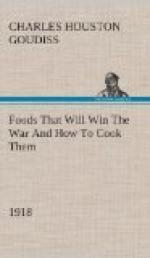Other causes of waste in food purchasing may be enumerated as follows: Ordering by telephone. This permits the butcher or grocer, who has no time to make selection of foods, to send what comes ready to hand; whereas if the housekeeper did her own selecting, she could take advantage of special prices or “leaders”—food sold at cost or nearly cost to attract patronage.
Buying out-of-season foods also makes marketing costly. Through lack of knowledge concerning the periods at which certain fruits and vegetables are seasonable, and therefore cheaper and in best flavor, housekeepers frequently pay exorbitant prices for poor flavored, inferior products.
Buying in localities where high rental and neighborhood standards compel the shopkeeper to charge high prices, the consumer pays not only for the rent and the plate glass windows, but for display of out-of-season delicacies, game and luxury-foods. Markets should be selected where food in season is sold; where cleanliness and careful attention prevail rather than showy display.
Many a dollar is foolishly spent for delicatessen foods. The retail cost of ready prepared foods includes a fraction of the salary of the cook and the fuel, as well as the regular percentage of profit. The food, also, is not so nourishing or flavorsome as if freshly cooked in the home kitchen.
Buying perishable foods in larger quantities than can be used immediately. Too frequently meats, fish, eggs, vegetables, milk and cream are purchased in quantities larger than needed for immediate consumption, and lack of knowledge of use of left-overs causes what is not eaten to be discarded.
Buying non-perishable foods in small quantities instead of in bulk. Food costs on an average 50 to 75 per cent. more when purchased in small quantities. Select a grocer who keeps his goods in sanitary condition and who will sell in bulk; then do your purchasing from him on a large scale and extend the sanitary care to your own storeroom.
Buying foods high in price but low in food value. Asparagus, canned or fresh, is not as nourishing, for instance, as canned corn or beans. Strawberries out of season do not compare with dates, figs or raisins which are to be had at all times.
Buying without planning menus. By this carelessness foods are often purchased which do not combine well, and therefore do not appeal to the appetite, and so are wasted. Unplanned meals also lead to an unconscious extravagance in buying and an unnecessary accumulation of left-overs.
Buying foreign brands when domestic brands are cheaper and often better.
Leaving the trimmings from meats and poultry at the butcher’s. Bring these home and fry out the fatty portions for dripping; use all other parts for the stock pot.




